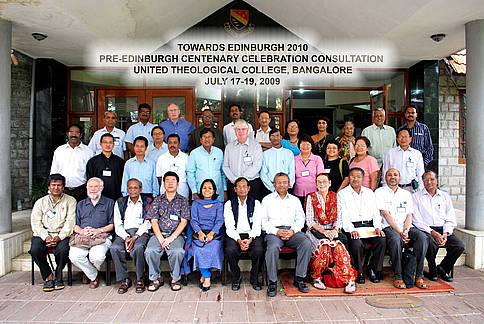Bangalore Pre-Centenary Edinburgh 2010 Study Conference
Inter-religious relations was the theme of this conference on 17-19 July 2009 at the United Theological College in Bangalore, India, which shares its centenary with Edinburgh 2010. Christian inter-religious relations were considered from Islamic, Hindu, Sikh, Jewish, subaltern, feminist and primal perspectives. There was also discussion of Christian relations with Marxist, humanist and secular ideologies, and of perspectives and issues in mission and inter-faith dialogue. Scholars in the field came from across India and from several other countries. The conference was initiated by Dr Israel Selvanayagam and organised by Dr Marina Behera. This regional event is making a significant contribution to Edinburgh 2010 Study Theme 2 'Christian mission among other faiths'.
Download the conference Report cum Statement here.
Conference papers
Download a list of the papers presented here.
Texts of papers are available below.
Group I: Interfaith Relations from an Islamic Perspective and Jewish Perspective
David Immanuel Singh, ‘Hundred years of Christian-Muslim Relations: Mission to Interfaith Relations.’
Steve Cochrane, ‘Historical Overview of Inter-Faith Relations in the Islamic Countries: The Presence of Christian Monks and Monasteries as Signposts of Faith.’
Andrew Wingate, ‘Issues in Christian Dialogue with Muslims in European Context.’
Martha Th. Fredericks, ‘Let us understand our differences: Current trends in Christian-Muslim Relations in sub-Sahara Africa.’
Group II: Interfaith Relations from a Hindu Perspective
K.P. Aleaz, ‘Christian Dialogues with Hinduism.’
Group III: Interfaith Relation from a Sikh Perspective
John Parry, ‘Dialogue with Sikhism in the Diaspora.’
James Massey, ‘A Review of 1910 Document from the perspective of Sikh Christian Dialogue.’
Group IV: Interfaith Relations from a Subaltern Perspective
T. Swamiraju, ‘Subaltern Movements: Insights fro Inter-Faith Dialogue.’
A. Alangaram, ‘Subaltern Movements before and after the Independence of India and the Impact of Roman Catholic Mission (from 1910 to 2009).’
Bolinkar Sokhlet, ‘Christian Mission and Primal Faith: The Need for an Inter-Faith Relation in the Khasi Jaintia Context.
J. Niraj Ekka, ‘Christianity and Tribal Religion in Jharkhand: Proclamations, Self-Definition and Transformation.’
Wati Longchar, Rethinking Mission in India: Looking from Tribal People’s Experience.’
Yesudoss Moses, ‘Christian Witness Today: Interfaith Relations from the Perspective of Subaltern people.’
T. Vanlaltlani, ‘Interfaith Relations in Mizoram from feminist Perspective with Emphasis on Mission.’
R.L. Hnuni, ‘Interfaith Relation in the Context of Primal Women in North East India with Emphasis on Christian Mission.’
Group V: Christian Relations with Marxist/Humanist/ Secular Ideologies
Pieter Verster, ‘Challenges to Christian Mission from the Struggle for Human Rights in the South African setting’.
Group VI: Interfaith Relations from a Feminist Perspective
Pauline Chakkalakal, ‘Dialogue and Partnership amidst Religious Pluralism,
Group VII: Perspective and Issues in Mission and Inter Faith Dialogue
Jonas Adelin Jørgensen, ‘Challenges in Global Christianity: Religions and the Goal of Christian Missions.’
D.K. Sahu, ‘Perspective and Issues in Mission and Interfaith Relations: Christian Participation in Nation Building in India.’
Shanta Premawardhana, ‘A Christian Ecumenical Exploration of Identity Dynamics.’
P.S. Jacob, ‘Christian Education and its Contextual Placement for Dialogue’
Roger Gaekwad, ‘Reconceptualizing Religious, Dialogue, Theology and Mission in Pluralistic Society: The Contribution of S.J. Samartha.’

